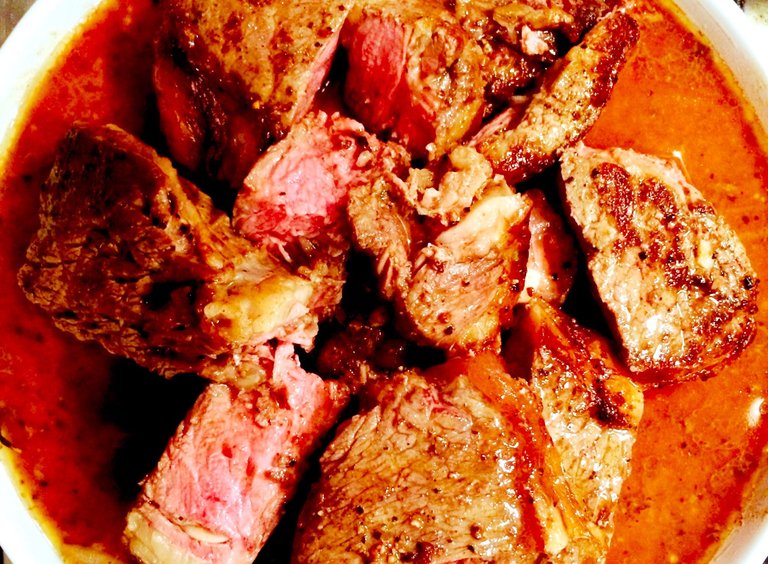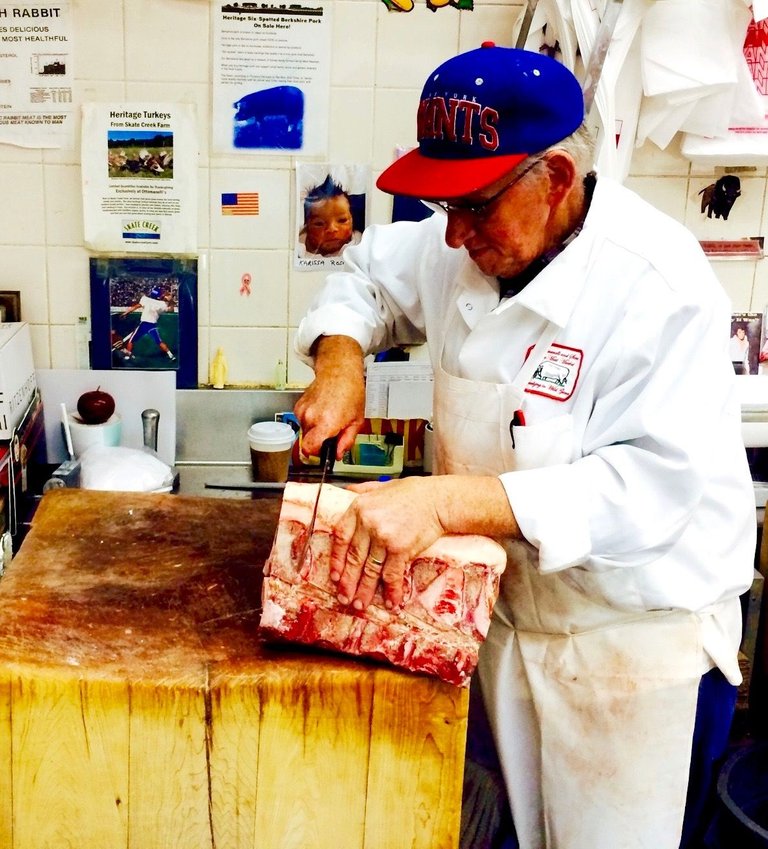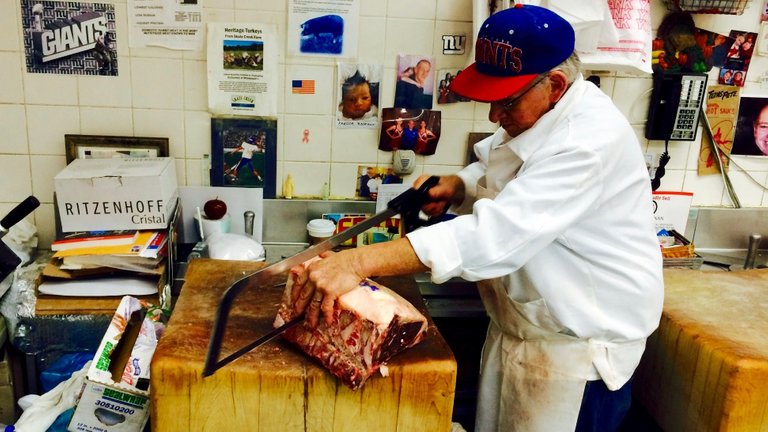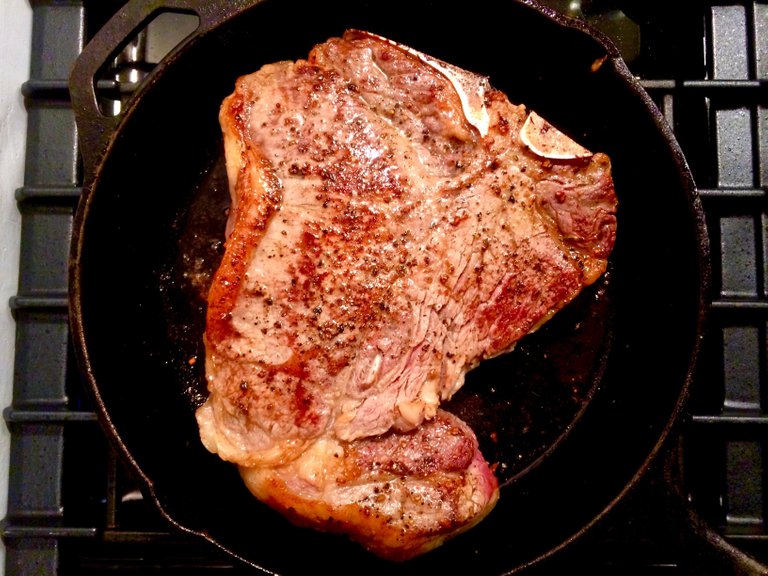
It's cold and wet outside. This weather is predicted to continue for the next three days. There’s the saying that March is “in like a lion and out like a lamb.” With March right around the corner, I would say that the lion is indeed about to roar. But I don't mind. I enjoy the seasons.
So the lion can run around outside all he wants, I'll be just fine tucking in, hovering around the kitchen stove. During chilly weather like this I tend to drift toward Texas cravings and comforts—the flavors of my youth—like spicy enchiladas in mole sauce, tomato soup and grilled cheese sandwiches, and of course, a beautifully prepared steak.
A Tasty Texan Heritage
Many may not understand Texans’ affinity to beef unless they’ve experienced the giant state’s endless, grassy prairie lands dotted with cow after cow. Beef is a Texan’s heritage. When you say “grass-fed” in Texas, most people think, “Of course. How else do cows eat?” Growing up, I had no idea that people were feeding cows corn and producing beef like car parts in a factory. I didn't know that massive industrialized beef consumption hurt the planet. All I had ever known were cows in the pasture, mooing away.
When I moved to Manhattan, I found many who would say, “I’m not a vegetarian, but I only eat chicken or fish, I NEVER eat beef.” This always amused me, as if eating beef was a bigger sin than say…chicken. I would also hear comments from the health-conscious, “I try not to eat red meat, but stick with chicken or fish.” It realized their very different ideas were culturally infused, as were my own, and that our taste buds lean towards our upbringing. Japan has its sushi; Germany, its pork. Maine brings in the lobster; Mexico, the avocado. Texas and Oklahoma? Beef is what’s for dinner.
Although I've been a meat-eating Texas gal, I believe eating meat requires respect, and that maybe all of one’s meals shouldn’t come with a side of cow… or chicken… or pig. I tend to agree with Michael Pollan, “Eat food, not too much, mostly plants." I believe that eating beef should be a special occasion and that its purchase and preparation should have respect.

What Happened to Our Neighborhood Butchers?
With so much packaged meat everywhere, I began wondering, have butchers disappeared into legend? Actually, there are still a few kicking around, and I’m not the only one wants more of them in our communities. Butcher shops are growing in Manhattan, and the demand is spreading throughout the U.S. (I also want to change agriculture as we know it and stop this crazy feed-lot producing meat farms, but hey...that's a whole other blog entry.)
This makes sense considering the new conscientiousness that has sprung up through our recent healthful food movements. Respectful meat eaters want a little more ceremony in the buying of flesh. And what about choice and quality? Plastic-wrapped meats on the refrigerated shelves do not tell us where the meat is sourced, how it’s been slaughtered, how long the shop has had it under its roof, or how it has been carved. Nor does it tell us the methods to which the meat should be stored and prepared. Only a butcher can tell you that.

The Butchers on Bleecker Street
One wintry evening, a friend of mine told me about the “Butchers on Bleecker Street.” This sounded like a crime novel, but it's actually Manhattan’s Ottomanelli & Sons Meat Market, which has been providing all the aforementioned qualities of a good butcher for over 100 years. "We should pick something up," she said, "make a good dinner." She didn't have to twist my arm. I checked to see if I had enough funds. Plans were made.
There was a line when we arrived, but it was worth the wait. The butcher asked us questions about what we liked and gave us suggestions on what would be good that day. We settled upon dry-aged porterhouse steaks—two meaty giants, perfect for six guests. He used a knife AND a saw to prep them, taking his time, giving the meat his full respect. He didn’t rush us and looked us in the eyes to make sure we were satisfied. He also didn’t mind me taking photos. He seemed completely aware of how mythical real butchers can seem these days.

Those porterhouse steaks were some of the best steaks I'd ever had…EVER. And that’s saying a lot from a drifting Texan like me. It was a lavish, expensive meal. The dinner was marvelous. The company was full of good cheer. The hearth felt complete and purposeful. Bellies were smiling.
The lion of winter may be prancing about outside, but a little nod to what your inner child is craving will warm you in no time, and for me, maybe once a year or so in weather like this, that’s a very nice, as-big-as-Texas steak.
Family-Style Porterhouse Steak for Special Occasions

Recipe by Elise McMullen-Ciotti
Note: Buying humanely raised beef is pricey, so save it for special occasions. You can prepare a good steak without a grill and without a giant kitchen. All it takes is one good heavy skillet, an oven pan that’s not too deep or too shallow, and a few spices and herbs to bring out the meats gorgeous flavor.
Ingredients
A good, and I mean good, butcher-approved, dry-aged porterhouse steak
Salt
Pepper
Garlic Powder (or garlic cloves, trimmed and cut into lengthwise slices)
Olive Oil
Grass-Fed Unsalted Butter
Tools
Iron skillet
Shallow roasting pan
Strong, slip-resistant tongs
Steak knife
Method
- Preheat oven to 375 degrees Fahrenheit.
- Coat the steaks in olive oil, dust with salt, pepper, and garlic powder. Let rest while pan heats. (If you’d like to use fresh garlic, pierce the steaks on both sides with a steak knife and insert the sliced garlic cloves in the holes.)
- Place an iron skillet over a high flame till it's near smoking hot.
- Place steak in pan and sear on both sides, briefly searing the edges as well by using your tongs to keep steak up on its sides.
- If you are making only one steak, place the skillet inside the preheated oven to finish cooking. If you need more room, transfer seared steaks into a shallow roasting pan and then place in oven.
- When steaks are at the preferred doneness (rare, med-rare, med, med-well, well), remove them from the oven and top each steak with one good-sized pat of butter. Let rest for 10 minutes before serving.
- If eating family style, cut steaks into smaller pieces and place in a serving dish. Pour the juices from the cooked steak over the pieces and serve. If not, place that happy steak on your plate and enjoy. Is it really that easy, Elise? Yes. Yes it is. Enjoy Steemians!

Great post! Steak is life!
Thanks @john-william!